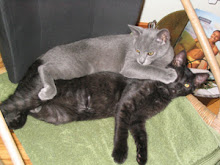Monday, June 28, 2010
16,
At this point I literally don't know one thing that's not on the page and I'm not worrying about decisions or consequence.
Sunday, June 27, 2010
13.
True: if you are put on a plain in nature (or, I suppose, a plane in geometry) and told to walk in a straight line, eventually you will walk in a circle.
I think writers might fear that fact but they also know it's true. If you put one sentence in front of another, how long does it take for the story you're producing to veer off that line you drew? Like: two sentences.
The extra worry is that every decision you make is actually a step in yet another different direction.
Today's theory: sometimes it's nice to just go on a walk and see what happens.
I think writers might fear that fact but they also know it's true. If you put one sentence in front of another, how long does it take for the story you're producing to veer off that line you drew? Like: two sentences.
The extra worry is that every decision you make is actually a step in yet another different direction.
Today's theory: sometimes it's nice to just go on a walk and see what happens.
Saturday, June 26, 2010
The Shallows, cont'd. (3)
...our unconscious thought processes don't engage with a problem until we've clearly and consciously defined the problem. If we don't have a particular intellectual goal in mind...unconscious thought does not occur.
-- Nicholas Carr, The Shallows, p. 119
My brain has been playing that language in a loop for a day now.
-- Nicholas Carr, The Shallows, p. 119
My brain has been playing that language in a loop for a day now.
Wednesday, June 23, 2010
The Shallows. (0)
Every project works roughly the same way: I go slowly at first, and it's hard to find the voice sentence by sentence. Then it's easier. Then there's a moment when it's much harder to see, even if I know the ending, what happens in between where I am and where the story finishes. Then I spot connections and write them down.
When there's a finished draft, there's a lot wrong and it bugs me. I can't really settle down, even when I'm not at the computer, because I know there are misplaced sentences, ideas, scenes, whatever. If the ms. is with a reader, I await judgment. I fidget. When the critical voices (my own, other people's) have spoken, I percolate. I rewrite. I rewrite. I get it wrong again. I stew. Then it's right enough to go out.
I re-read many times, even if it's been published. I still find things to change. I mark up versions. If I'm doing a reading I might read a newer version of the story.
That's not what's happening now.
Instead, if a piece of artistic work is like a body, and the movement of ideas is like the flow of blood, each heartbeat forces the blood to move, because it's not the nature of blood to move on its own. You need impetus. The heartbeat is the will to make things move and change. I think the internet is good at silencing my heartbeat.
What I mean by this -- and for once on this blog, I'm relatively concerned with being clear to readers who aren't me -- is that with every point I describe above, every sticking point, every place on the decision tree where only my own anxiety, focus and will can cause a story to go forward, every time, the internet is an easier place to go than the confines and difficulties of my own mind.
How that works is like this: I get five pages into a story. There's a moment where a character is (for instance) offered a profiterole and wonders if he'll get it on his cashmere sweater. (No, that's not a real example, but...) I myself don't know the answer: does he take the profiterole or not? The question bothers me. I need to look away. Now, normally, meaning most of my working life, I am only looking away on one level, by literally getting up and walking around, eating an apple, bothering the dog. And inside my mind, there's that heartbeat of unconsciousness forcing ideas around my brain. Profiteroles. Cashmere. Not only will he say yes, but he'll get it on his sister's satin jacket, the one given to her by the Princess of Malfi. It will estrange them. And, having thought that, back to the story, where I write again until it gets hard, again.
But now: the worst possible thing, instead. I might think "I'll look up 'profiterole' on the internet." (Not doing that right now -- I'm only mildly sure of what a profiterole is. I've seen the word repeatedly lately, in that 'Shrimp/Plate of Shrimp' way.) I look it up. I find something interesting. I check my email. I find something interesting. I stop finding interesting things. I don't let that stop me. I wonder how Obama's doing with the oil spill. I wonder how my friends are doing. I accidentally find out how my enemies are doing (they're doing well, so thoughtful of me to ask) and I scowl and then I need to look at movie trailers and then, oh, there's another email, and oh, profiteroles are cream-filled French pastries with beads of dry sugar at the top. (No, they aren't but there's no fucking way I'm getting on the net to research that.) This gives me an idea, I think, and I go back to the story.
Which I find I don't care about that much. But I put it in. I find some reason it works. I move ahead.
Repeat this for every hard decision I need to make. I might get deeper into the story in the sense of it being closer to finished, but the sense of urgency and blood I had is somehow diluted. My ability to make connections among disparate things is lessened. Some level of critical thinking is impacted. I find that when I am anxious that instead of putting that energy into writing, I want to check my email. I want to look stuff up. The urge to make connections is a heartbeat, too, it's a source of life. I worry that the net is killing my heartbeat.
I'm working hard on the concept of living in one place at a time. This blog is, in its impenetrable way, part of that. Another part is to work on only one thing. So, right now I'm working on a response essay for a website that said very nice things about my recent novel. But as I'm doing it I'm reading The Shallows by Nicholas Carr, about these very issues, and I'm seeing a reflection of what I've been writing about: how our ability to make narrative might just be coming unwound.
How do we fix this?
When there's a finished draft, there's a lot wrong and it bugs me. I can't really settle down, even when I'm not at the computer, because I know there are misplaced sentences, ideas, scenes, whatever. If the ms. is with a reader, I await judgment. I fidget. When the critical voices (my own, other people's) have spoken, I percolate. I rewrite. I rewrite. I get it wrong again. I stew. Then it's right enough to go out.
I re-read many times, even if it's been published. I still find things to change. I mark up versions. If I'm doing a reading I might read a newer version of the story.
That's not what's happening now.
Instead, if a piece of artistic work is like a body, and the movement of ideas is like the flow of blood, each heartbeat forces the blood to move, because it's not the nature of blood to move on its own. You need impetus. The heartbeat is the will to make things move and change. I think the internet is good at silencing my heartbeat.
What I mean by this -- and for once on this blog, I'm relatively concerned with being clear to readers who aren't me -- is that with every point I describe above, every sticking point, every place on the decision tree where only my own anxiety, focus and will can cause a story to go forward, every time, the internet is an easier place to go than the confines and difficulties of my own mind.
How that works is like this: I get five pages into a story. There's a moment where a character is (for instance) offered a profiterole and wonders if he'll get it on his cashmere sweater. (No, that's not a real example, but...) I myself don't know the answer: does he take the profiterole or not? The question bothers me. I need to look away. Now, normally, meaning most of my working life, I am only looking away on one level, by literally getting up and walking around, eating an apple, bothering the dog. And inside my mind, there's that heartbeat of unconsciousness forcing ideas around my brain. Profiteroles. Cashmere. Not only will he say yes, but he'll get it on his sister's satin jacket, the one given to her by the Princess of Malfi. It will estrange them. And, having thought that, back to the story, where I write again until it gets hard, again.
But now: the worst possible thing, instead. I might think "I'll look up 'profiterole' on the internet." (Not doing that right now -- I'm only mildly sure of what a profiterole is. I've seen the word repeatedly lately, in that 'Shrimp/Plate of Shrimp' way.) I look it up. I find something interesting. I check my email. I find something interesting. I stop finding interesting things. I don't let that stop me. I wonder how Obama's doing with the oil spill. I wonder how my friends are doing. I accidentally find out how my enemies are doing (they're doing well, so thoughtful of me to ask) and I scowl and then I need to look at movie trailers and then, oh, there's another email, and oh, profiteroles are cream-filled French pastries with beads of dry sugar at the top. (No, they aren't but there's no fucking way I'm getting on the net to research that.) This gives me an idea, I think, and I go back to the story.
Which I find I don't care about that much. But I put it in. I find some reason it works. I move ahead.
Repeat this for every hard decision I need to make. I might get deeper into the story in the sense of it being closer to finished, but the sense of urgency and blood I had is somehow diluted. My ability to make connections among disparate things is lessened. Some level of critical thinking is impacted. I find that when I am anxious that instead of putting that energy into writing, I want to check my email. I want to look stuff up. The urge to make connections is a heartbeat, too, it's a source of life. I worry that the net is killing my heartbeat.
I'm working hard on the concept of living in one place at a time. This blog is, in its impenetrable way, part of that. Another part is to work on only one thing. So, right now I'm working on a response essay for a website that said very nice things about my recent novel. But as I'm doing it I'm reading The Shallows by Nicholas Carr, about these very issues, and I'm seeing a reflection of what I've been writing about: how our ability to make narrative might just be coming unwound.
How do we fix this?
Sunday, June 6, 2010
In Medias Res, June 2010 edition
1. Two-thirds of a draft involving the animatronic kangaroo. I now realize the kangaroo must go, which means the big shoot out in which the kangaroo walks away into the distance, flipping his lucky coin, must go. I think I'm going to focus on people instead.
2. Just a few lines of dialogue, maybe five minutes worth, read aloud, and the faintest hint of how this could be self-contained. The containment is attractive. I have thought of those Matthew Barney scrawls under the dome of SFMOMA as both annoying and as having a point.
3. Just the concept: a two-handed story, an interview that goes horribly wrong.
4. Two-thirds of a draft in which The Courage Test should show up. But so far it doesn't. This might be the author's fault.
5. Lolly.
6. This is actually next, and what's holding me back is tone. Followed by shape. But tone is critical right now.
I have been wondering whether multitasking would work.
No.
2. Just a few lines of dialogue, maybe five minutes worth, read aloud, and the faintest hint of how this could be self-contained. The containment is attractive. I have thought of those Matthew Barney scrawls under the dome of SFMOMA as both annoying and as having a point.
3. Just the concept: a two-handed story, an interview that goes horribly wrong.
4. Two-thirds of a draft in which The Courage Test should show up. But so far it doesn't. This might be the author's fault.
5. Lolly.
6. This is actually next, and what's holding me back is tone. Followed by shape. But tone is critical right now.
I have been wondering whether multitasking would work.
No.
Subscribe to:
Comments (Atom)




